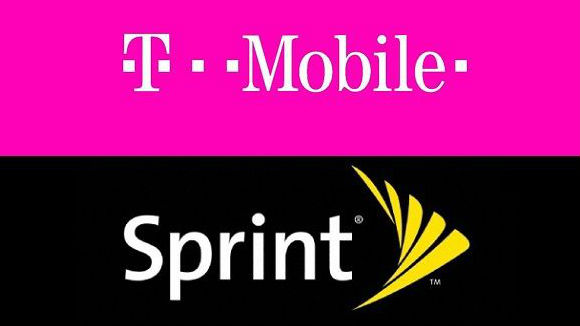T-Mobile, Sprint to Combine in $146B All-Stock Deal
The smarter way to stay on top of the multichannel video marketplace. Sign up below.
You are now subscribed
Your newsletter sign-up was successful
Perhaps the third time is the charm.

Sprint and T-Mobile agreed to an all-stock merger that will value the combined company at $146 billion (including debt) and create a more formidable No. 3 wireless carrier with more than 100 million customers.
Several reports said the two were close to a deal on Friday.
This is the third time that the two companies have tried to join forces. In 2014 the deal was scrapped after federal regulators hinted that they would not approve the deal. In November, the companies again tried to reach a deal, only to pull the plug after they couldn’t agree on control issues. Earlier this month, the two came back to the negotiating table.

The control issues appear to have been worked out, with T-Mobile executives dominating the top roles in the new company, which will assume the T-Mobile name. T-Mobile CEO John Legere will run the new company with the same title, with his No. 2, T-Mobile president and chief operating officer Mike Sievert keeping the same role in the new entity. Tim Höttges, current T-Mobile US Chairman of the Board, will serve as Chairman of the Board for the new company. Masayoshi Son, chairman and CEO of Sprint’s owner SoftBank Group and Marcelo Claure, current Sprint CEO, will serve on the board of the new company.
“This combination will create a fierce competitor with the network scale to deliver more for consumers and businesses in the form of lower prices, more innovation, and a second-to-none network experience – and do it all so much faster than either company could on its own,” Legere said in a statement. “As industry lines blur and we enter the 5G era, consumers and businesses need a company with the disruptive culture and capabilities to force positive change on their behalf.”
According to the deal, Sprint shareholders will receive exchange 9.75 Sprint shares for every share of new T-Mobile stock. At closing, T-Mobile parent Deutsche Telekom will control about 42% of the company, Softbank will hold 27% and the public will control 31% of shares.
The smarter way to stay on top of the multichannel video marketplace. Sign up below.
Deutsche Telekom also will control about 69% of the vote of the new company and has the right to elect nine of the 14 members of the board of directors. The companies expect to close the deal in the first half of next year.
On a conference call with analysts, Claure said the catalyst for changing its mind about the control issues was simple.
“The big change of why we were able to do this so fast is a very simple rule of business: both companies need each other,” Claure said. “The reason why this is going to work is that T-Mobile can’t do the 5G strategy without Sprint and Sprint cannot do it without T-Mobile.”
The next biggest hurdle for the merger will be in obtaining regulatory approval. While the government usually frowns on mergers that eliminate a competitor in any industry – T-Mobile is the third largest wireless carrier and Sprint is the fourth largest behind Verizon Communications (No. 1) and AT&T (No. 2) – both companies have said the deal is necessary for their survival in the cutthroat wireless business. And they claim the deal is necessary to fund the creation of new 5G wireless services.
The combined company – headquartered in Bellevue, Wash., and in Overland Park, Kans. – will employ about 200,000 people. The new entity also pledged to invest up to $40 billion in its new network and business in the first three years after the deal is closed.
On a conference call with analysts, Legere said that there are at least seven or eight large wireless competitors in the industry. Aside form Verizon, AT&T, Sprint, and T-Mobile, Comcast introduced wireless service Xfinity Mobile last year and Charter Communications is launching its own service later this year.
“This isn’t a case of going from four to three wireless companies,” he said.
And though the current presidential administration is thought to be more open to big deals, it isn’t a rubber stamp. The U.S. Department of Justice sued to block the AT&T-Time Warner merger, a move that is expected to be decided by the courts soon.
According to reports, Dish Network also could play a role in the deal’s approval. Dish already has amassed a huge swath of wireless spectrum and has expressed plans to launch its own IoT wireless service.
Depending on whether Dish’s wireless offering will compete directly with Sprint and T-Mobile, that offering too could be used as an example that competition won’t be affected.
But others see the deal differently.
“No one but T-Mobile and Sprint executives and Wall Street brokers wants to see this merger go through,” Free Press policy director Matt Wood said in a statement. “Greed, and a desire to reach deeper into people’s wallets by taking away their choices, are the only things motivating this deal.”
Wood added that mergers are supposed to enhance competition and serve the public.
“This deal would do just the opposite: It would destroy competition, eliminate jobs, and harm the public in numerous irreversible ways,” Wood said in the statement.
The complicated deal also had a slew of financial and legal advisors, including PJT Partners, which is serving as financial advisor to T-Mobile; and Goldman Sachs, serving as financial advisor to Deutsche Telekom. T-Mobile Deutsche Bank also acted as financial advisor to T-Mobile. Wachtell, Lipton, Rosen & Katz is providing legal counsel to T-Mobile and Deutsche Telekom, with Cleary Gottlieb and DLA Piper serving as regulatory counsel. Evercore is acting as financial advisor to a committee of independent directors of T-Mobile and Latham & Watkins is providing legal counsel to the committee of independent directors. Morgan Stanley served as financial advisor to Deutsche Telekom. Barclays, Credit Suisse, Deutsche Bank, Goldman Sachs, Morgan Stanley, and RBC are providing T-Mobile with committed debt financing to support the transaction, and PJT Partners is advising T-Mobile on the debt financing associated with the transaction.
The Raine Group LLC is acting as lead financial advisor to Sprint. J.P. Morgan is also acting as a financial advisor to Sprint. Centerview Partners LLC is acting as financial advisor to the Independent Transaction Committee of the Board of Directors of Sprint. Morrison & Foerster LLP is lead legal counsel to Sprint and for SoftBank Group. Goodwin Procter LLP is legal counsel to the Independent Transaction Committee of the Board of Directors of Sprint. Skadden, Arps, Slate, Meagher & Flom LLP is regulatory co-counsel and Potter Anderson Corroon LLP is Delaware Counsel. Mizuho Securities Co., Ltd. and SMBC Nikko Securities Inc. are acting as financial advisors to SoftBank Group.
